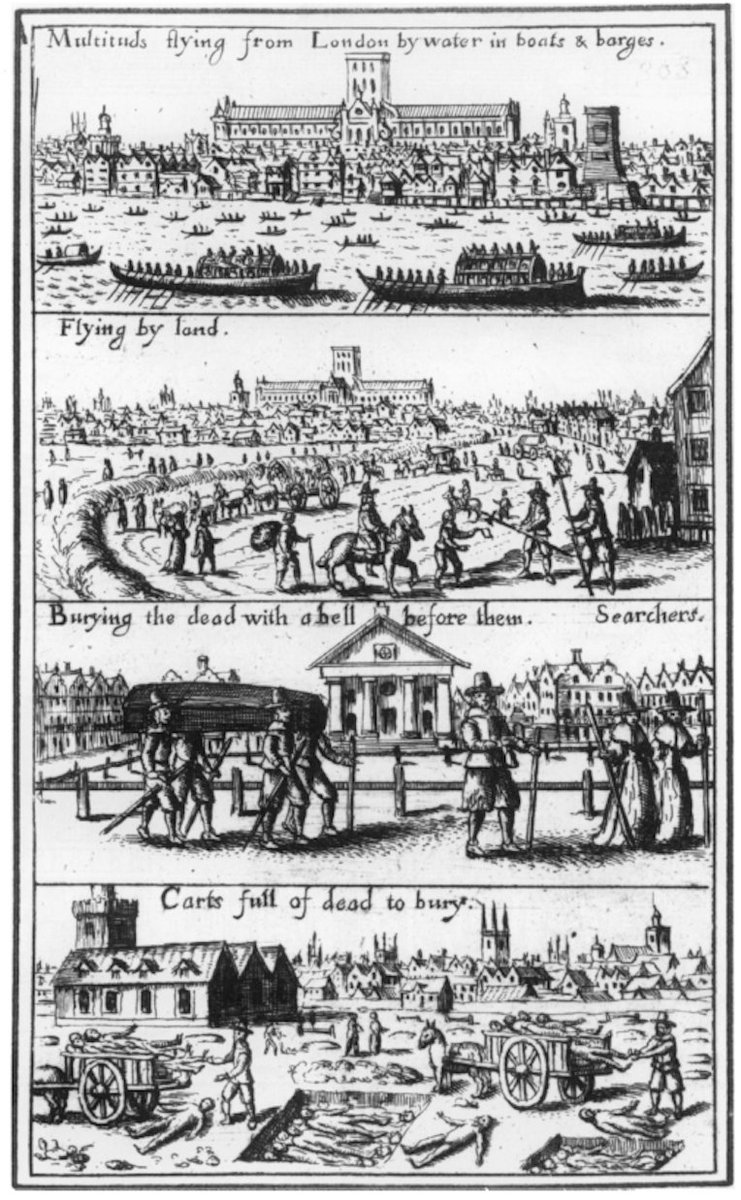‘Plague nurses, cleansers, and searchers: the female key workers of seventeenth-century Newcastle’. This paper will explore female experiences of plague through their often overlooked roles in early modern public health provision #EMQuon 1/15
Coronavirus has brought the normal rhythms of everyday life to a standstill. Regulations now dictate where we may travel and who we may interact with. It has also highlighted the efforts of key workers who have maintained essential services throughout the crisis #EMQuon 2/15
History may not repeat itself, but it rhymes. During the early modern period, bubonic plague was endemic in England. Then, as now, regulations were imposed in an attempt to stop the spread of disease and key workers were employed to care for the most vulnerable #EMQuon 3/15
In the 17th C, patients needed to be cared for, bodies needed to be counted, the cause of death identified, and the houses of the deceased fumigated and cleansed. Most of these responsibilities fell upon the shoulders of early modern women #EMQuon 4/15
Poorer women were hired in a number of roles specifically designed to meet the expanding needs of their communities. These women were responsible for a significant proportion of Newcastle's medical provision during the early modern period #EMQuon 5/15
The occupation that appears most frequently in the wills and inventories of plague victims in Newcastle is the cleanser. Cleansers were largely responsible for disinfecting the houses and goods after the death, or recovery, of the infected #EMQuon 6/15
The 2nd most frequent occupation listed in the Newcastle probate records is the keeper. The term ‘to keep’ was synonymous with ‘to nurse’ or ‘to care for’. Keepers were responsible for the wellbeing the infected, particularly when quarantine had been enforced #EMQuon 7/15
To provide some context for social distancing, one statute stated that keepers were not permitted to walk without displaying a 3 ft red rod. They were not to enter any household except that which they had been sent to attend and were to abstain from all other company #EMQuon 8/15
Plague searchers, on the other hand, were required to enter the homes of any individual suspected of contracting the disease. A 1578 statute required local authorities to appoint ‘two honest and discrete matrons' to search the households of the deceased #EMQuon 9/15
Unlike keeping or cleansing, searching was not simply a task, performed by poor women for their neighbours; it was an office, bestowed upon certain women by the parish, laden with considerable responsibility #EMQuon 10/15
Searchers were required to search the homes of their neighbours for suspected plague victims and report their findings. This information was then passed on to the local authorities so that they might accurately determine the severity of an outbreak at any given time #EMQuon 11/15
Although they remain virtually invisible to us, women searchers would have been a familiar sight to contemporaries. Their image can be found in the 3rd frame of this anonymous 1665 broadsheet which depicts four scenes from an outbreak of plague #EMQuon 12/15
Together, the cleansers, keepers and searchers of 17th C Newcastle provided essential services within their communities, often at great risk to their own health and wellbeing #EMQuon 13/15
Today, just like those who lived through epidemics of the past, we are facing a formidable disease without an obvious cure. These are daunting, but not unprecedented times in which the courageous work of key workers is more important than ever #EMQuon 14/15
To the best of my knowledge there was no clap for the key workers of 17C Newcastle, but by recovering their voices and experiences we can restore their work to the historical record and remind ourselves of the remarkable endurance of kindness in times of crisis #EMQuon 15/15

 Read on Twitter
Read on Twitter


